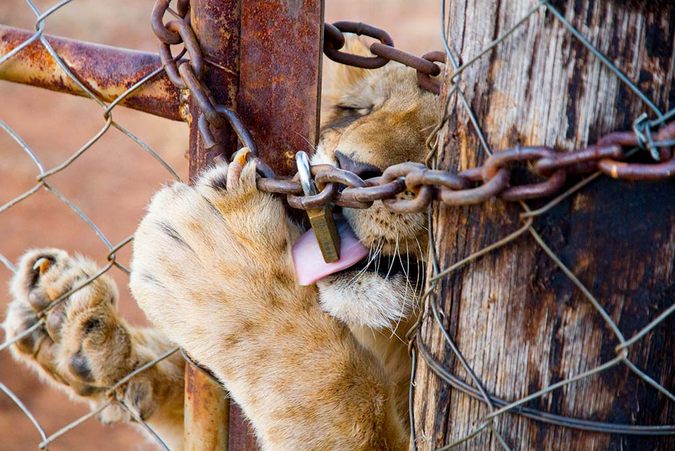
NEWS DESK POST by Humane Society International/Africa (HSI/Africa)
A nationwide survey, by the Humane Society International (HSI), has revealed that the majority of South Africans believe the captive lion breeding industry is harming the country’s international reputation. This announcement comes on the first of a two-day South African Parliamentary inquiry into the lion breeding industry. According to the study, South Africans demonstrate a deep dislike of activities associated with the lion breeding industry, including trophy hunting and canned hunting of tame lions, and are also concerned that the trade in lion bones will stimulate market demand leading to increased poaching of lions and big cats.
The results showed the following:
• That South Africans, by more than a three to one margin, agree that the industry is harming South Africa’s international reputation, with 65% strongly agreeing/agreeing, and 21% strongly disagreeing/disagreeing;
• More broadly, 56% of South Africans fully oppose/oppose to some extent trophy hunting, 60% fully oppose/oppose to some extent canned lion hunting;
• And by nearly a six to one margin, 77% strongly agree/agree with conservationists who say that the trade in lion bones will stimulate market demand leading to increased poaching of lions and big cats.
Results followed the recent local and global backlash against an announcement by South Africa’s Department of Environmental Affairs that it would allow 1,500 captive-bred lion skeletons to be exported this year, nearly double last year’s export quota of 800 captive-bred lion skeletons. South Africa’s lion breeding industry has been under the spotlight since the 2015 release of the award-winning film Blood Lions® and the eponymous Blood Lions® Campaign, of which Humane Society International is a partner.
“These polling results demonstrate that South Africans are overwhelmingly concerned industry is harming South Africa’s international reputation,” said Audrey Delsink, executive director of HSI/Africa. “The captive lion breeding and the lion bone trade is South Africa’s claim to shame. Last year’s bone export quota of 800 was shocking enough: the increase to 1,500 in 2018 has no scientific basis and is a blatant license to kill for the lion breeding industry.”
At the same time, a new report from the South African Institute of International Affairs, commissioned by HSI, found that captive lion breeding industry revenue – from lion cub petting and lion walking tourist attractions – is less than 2% of South Africa’s tourism revenue. Yet, the study finds the lion breeding industry as a whole, including these attractions as well as canned lion hunting and skeleton exports, may seriously undermine the international reputation of South Africa and harm the tourism industry. The study concluded that, “the opportunity costs and negative externalities associated with the predator breeding industry may – along with other threats facing wild lion survival – undermine South Africa’s brand attractiveness as a tourism destination by up to R54.51bn over the next decade.”
Delsink says that public opinion and scientific analysis show that, instead of bolstering this unpopular industry by allowing the export of captive-bred lion skeletons, the South African government should be shutting it down. “The South African government can no longer justify a scandalous industry that is condemned by the South African public, only benefits the pockets of breeders and traders, and threatens to seriously damage South Africa’s tourism sector.”
The survey results can be viewed here.
ADDITIONAL INFORMATION
• According to a report submitted to the 30th meeting of the CITES Animals Committee in July 2018, Vietnam was the largest importer of lion bodies and the second-largest importer of skeletons. Lao People’s Democratic Republic was the largest importer of lion bones and skeletons. The United States was the largest importer of lion trophies. The report suggested that some lion poaching and trafficking involves organised criminal groups, and seizures alongside other commodities such as rhino horn indicate that these groups are dealing in multiple species.
• Read The Extinction Business: Lion bone trade threatens world’s big cats – an investigative report by EMS Foundation and Ban Animal Trading that reveals startling and alarming factors that have a significant negative impact on worldwide big cat conservation.
To comment on this story: Login (or sign up) to our app here - it's a troll-free safe place 🙂.![]()






